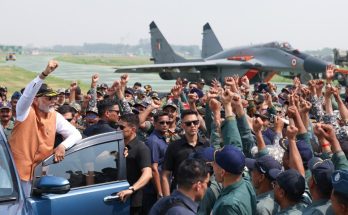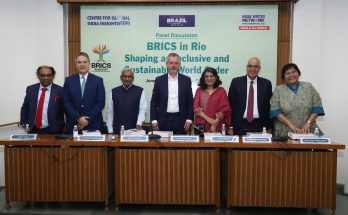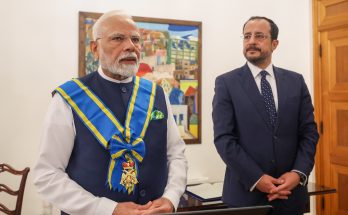
The ongoing acceleration and transformation in India-Bangladesh relations, an emerging model for the region, will be showcased and celebrated during the two days Prime Minister Narendra Modi will spend in the neighbouring country.
PM Modi’s choice of Bangladesh as his first overseas destination after the outbreak of the coronavirus pandemic underscores the importance he places on nurturing this vital relationship which is mutually enriching and empowering for both countries.
The March 26-27 visit is mostly ceremonial in nature, and celebrates what Foreign Secretary Harsh Vardhan Shringla terms as a “sonar adhyay” (golden chapter) in the annals of India-Bangladesh relations.
In a special gesture, PM Modi has been invited by the Bangladesh government on the occasion of the triple celebrations – Mujib Borsho, the birth centenary of Sheikh Mujibur Rahman; 50 years of the establishment of diplomatic ties between India and Bangladesh; and 50 years of Bangladesh’s war of liberation. PM Modi will attend the National Day programme of Bangladesh on March 26 as the Guest of Honor.

The importance of the visit could be gauged from the fact that as Bangladesh commemorates 50 years of independence “they have invited our Prime Minister to share the dais”, India’s Foreign Secretary Harsh Vardhan Shringla said ahead of the visit. India’s top diplomat also highlighted that ties between the two countries have no parallel and have evolved to become “a model” for others to emulate. Mr Shringla also pointed out that Indian soldiers had fought and had been killed alongside Bangladeshis for their independence – “rarely has people of one country shed blood for another country.”
The visit will not only be high on colour and optics, but will also deliver substantive outcomes that can steer the India-Bangladesh relations into new areas of cooperation such as forging a partnership in start-ups. In a curtain-raiser briefing in New Delhi, Mr Shringla said told journalists that a number of announcements, bolstering cooperation in areas such as health, railway connectivity, border development and start-ups, are expected to be made. “Both sides will sign a range of agreements during the Prime Minister’s visit. These agreements will cover a number of areas of our cooperation, such as disaster management, trade, and oceanography,” he added.
Focus on Trade

The two sides are looking to sign an important trade agreement with a view to upscaling their economic partnership. However, this trade pact could be different from a comprehensive economic partnership agreement (CEPA) the two countries have been negotiating. There will be visible progress in finalizing Comprehensive Economic Partnership Agreement (CEPA), reliable sources said. Indian companies are optimistic about scaling their investment in Bangladesh given its growing stature as one of the fastest growing economies in the region. Bangladesh is expected to graduate from the UN’s Least Developed Country status in 2026. Officials said that CEPA’s scope will be wider than a traditional bilateral free trade agreement and will address non-trade barriers, e-commerce, services investment and facilitation of trade at the border.
India is the second largest trading partner of Bangladesh after China. Bilateral trade is estimated to be around $11 billion. The talks in Dhaka will focus on addressing Dhaka’s concerns over growing trade deficit, which has now gone up to over $9 billion.
Connectivity
Promoting connectivity and infrastructure projects with a view to accelerating development of India’s Northeast states will be an important outcome of PM Modi’s visit. Ahead of his visit to Dhaka, PM Modi put the spotlight on enhancing connectivity between India and Bangladesh by inaugurating the ‘Maitri Setu’ (Friendship Bridge) and other infrastructural projects in Tripura, India’s northeastern state. The bridge is rightly called the “gateway of Northeast” as it will connect the landlocked region with Chittagong port in Bangladesh, unlocking the untapped markets of other east and south east economies.
A World Bank report said that seamless movement of vehicles between India and Bangladesh for trade could raise India’s national income by eight per cent and Bangladesh’s by 17 per cent; provide faster and cheaper access to products from Northeast and boost real income in states such as West Bengal, Uttar Pradesh and Maharashtra.
Moving beyond recurrent themes in bilateral relationship, the overarching message from PM Modi’s Dhaka visit will be a reaffirmation and celebration of shared cultural heritage and robust people-to-people ties that power the multi-faceted strategic partnership between the two countries.
(Manish Chand is CEO of India Writes Network and India and the World magazine. He is currently in Dhaka to report on and analyse Prime Minister Narendra Modi’s visit to Bangladesh. Follow him on @scepticcryptic @IndiaWritesTGII)
Author Profile

- Manish Chand is Founder-CEO and Editor-in-Chief of India Writes Network (www.indiawrites.org) and India and World, a pioneering magazine focused on international affairs. He is CEO/Director of TGII Media Private Limited, an India-based media, publishing, research and consultancy company.
Latest entries
 India and the WorldJune 16, 2025Amid Pakistan-Turkey nexus, Cyprus joins India against cross-border terror
India and the WorldJune 16, 2025Amid Pakistan-Turkey nexus, Cyprus joins India against cross-border terror India and the WorldMay 8, 2025Pahalgam payback: India exposes Pakistan’s lies, misuse of religious sites for training terrorists
India and the WorldMay 8, 2025Pahalgam payback: India exposes Pakistan’s lies, misuse of religious sites for training terrorists India and the WorldMay 3, 2025IMEEC provides a democratic alternative to BRI: Italy’s former foreign minister (Interview)
India and the WorldMay 3, 2025IMEEC provides a democratic alternative to BRI: Italy’s former foreign minister (Interview) India and the WorldApril 21, 20253T Template for India-US Mega Partnership
India and the WorldApril 21, 20253T Template for India-US Mega Partnership







